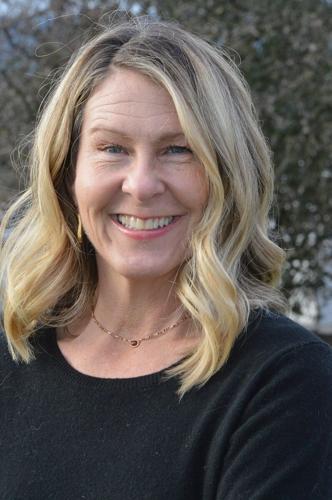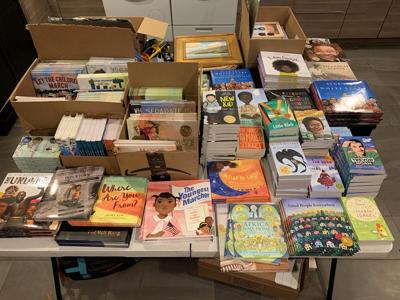Quietly, during the pandemic, parents on both sides of the Columbia River raised funds independently to expand horizons in classrooms in Hood River and White Salmon.
At its start, the Classroom Books For Change project yielded more than $6,000 for Hood River County schools, through 71 donations, allowing organizer Denice Bukanovsky to work with schools to purchase books from Black, Latino and Indigenous perspectives for every elementary classroom and libraries in Hood River County School District. It’s about 600 books, with more to come, all selected by teachers.

Denice Bukanovsky
She’s expanded the monetary goal and has plans to create a statewide foundation to help other schools do the same.
“I wanted to do something that will help truly work toward change,” Bukanovsky told the Hood River County School Board in a recent meeting, where she was honored for her project.
“What Denice did was contagious, in a good way,” said District Curriculum Director Bill Newton, formerly Westside Elementary principal through the 2019-20 school year, when Bukanovsky developed the project.
Much of the fundraising happened through the Go Fund Me/Classroom Books for Change account, which is still live and accepting donations.
“It really has been the highlight of my year,” Bukanovsky said. “It is a project the kids have helped me with, too,” referring to her daughter and son, who are in high school and middle school.
But Bukanovsky’s outreach went beyond Hood River; she contacted parents Dale Pytel and Lee Lloyd in White Salmon, who are duplicating the same effort there.
“Lee worked with a teacher who submitted a request to the education foundation and they funded another $3,000. Lee and Dale coordinated with the schools and purchased books through Waucoma exclusively. Their efforts ignited one of the teachers, and she requested money from White Salmon Education Foundation, which is very active and many community members go directly to them and it’s pretty seamless,” Bukanovsky said.
“It was a wonderful success in White Salmon,” Pytel said. “We were able to raise close to $1,600 from private donors and due to the community support, we received a generous donation from the White Salmon Education Foundation. So far, we have purchased hundreds of books for Whitson and the intermediate school. And have plans to purchase more in the near future. The books were requested by the teachers. It’s an honor to be a part of getting these important and beautiful books in the hands of our children.”
Bukanovsky said that after George Floyd and the protests gained momentum, “I felt like I wanted to do something productive and change hearts and minds of kids. They can learn in two places, in the home and school. And I wanted to find a place to impact them for years to come.”
Bukanovsky said the books selected “intend to develop pride in racial diversity and compassion and understanding of others.” Bukanovsky’s long-term goal is to create a foundation and expand the project statewide, if not nationwide. She has an immediate $10,000 goal for Hood River County schools. Donations are still welcome — at gofund.me/f6c659bf — and anything exceeding the goal places many welcome titles in the elementary schools and expands the project into the middle schools, where she was unable to fill all the teacher requests.
“Friends in other communities out of state reached out and we’ll see where it goes,” Bukanovsky said. “It can certainly be a wonderful thing for our kids, for years to come.”
Anyone wishing to contact her about making a direct donation can do so at classroombooksforchange@gmail.com.
Many books for the upper valley are Spanish translations or Spanish originals, and many books received Caldecott, Newbery Medal, Coretta Scott King and Pura Belpre awards. She focused the collection on Black, Latino and Indigenous topics and authors, as well as multi-racial authors and illustrators.
Roughly half the books are in Spanish or relate to the Hispanic experience.
“I think a lot of the Hispanic stories are going to resonate,” she said. “There a lot of beautiful stories that, for the Hispanic community, I want to feel empowered, and for the white community, I want to feel a sense of understanding.
“I wanted to make it very clear to our community these were not books I was choosing. The premise and scope I chose, but the teachers chose the books.”
She started at Westside Elementary, where her kids had attended.
“It started with me emailing one teacher, and I thought, ‘I can buy books for all the teachers’, starting with Westside only, and with the goal that if that was quickly funded, I would expand it,” Bukanovsky said. “And within two days I had $700, just through emailing and texting, and I knew.”
She expanded the goal to $6,000, and emailed all principals to ask teachers if they wanted Black, Latino and Indigenous stories “that develop compassion and head us down the road to social justice, and immediately, I got an expansive list from Westside teachers and shared with principals a sample list and a reading list from a middle school teacher, and there was such quick response and they were very enthusiastic, so I knew I had to make my goal of getting the money then, so I worked all summer (2020), one contact at a time.”
Help came via proceeds from organized events involving donated auction items, as well as individual donations — many word-of-mouth — and a Hood River Rotary gift.
Bukanovsky spent $3,000 at Waucoma Bookstore in Hood River and researched Black-owned bookstores in the Bay Area and Tulsa. On May 21, the Oklahoma town observes the 100th anniversary of the 1921 massacre of more than 100 Black citizens and destruction by white mobs of the Greenwood district.
Bukanovsky said she discussed with Newton whether the project “would land well, or be too controversial, but we found that books are very compassion-building.”
HRCSD Board Chairman Rich Truax told her, “Your effort strikes at the center of what we need to do to grow out of this.”
Board Member Chrissy Reitz said, “You never shy away from getting in there and helping, but what I am most impressed with is at a time with people trying to figure out how to reach out, you just plunged right in.”
Board Member Korinda Hankins-Elliot told Bukanovsky, “Everyone is torn and will be torn, and the fact that you came up with this idea to start this on your own and raise money and buy these books and have the teachers help is wonderful.”
Recent additions include copies of Amanda Gorman’s “The Hill We Climb” for middle schools.
Hood River Middle School Principal Brent Emmons wrote in a card to Bukanovsky, “The books on racial justice will impact thousands and thousands of kids; the awareness and changed hearts will help our community, country and the world. I can think of few more important initiatives s than helping people understand one another.”
Goal expanded
Bukanovsky announced March 8 that has expanded the goal to $10,000.
Asked what books stand out for her, Bukanovsky said, “I know the middle school does a good job teaching civil rights, but the elementary books are so powerful. There’s one called ‘Blue Sky White Stars’ and another one called ‘The Undefeated,’ both simple, impactful picture books with simple language that shows strength, pride and the right to equality. The books tend to follow a couple of avenues, many are slave-trade oriented, and others are on later injustice.
“There are some that are really impactful in that way and some that just speak so much compassion and kindness and love, and we all need to get more of that to get to that unified place in our hearts,” said Bukanovsky, who is a self-employed accountant and “mostly a stay-at-home mom with flexibility to take on special projects.
“Working for the good of our community, particularly the children in the community, is most rewarding and a good example for my own kids. I hold a strong sense of civic duty and civic discourse. Whether you have children or not, our future is forever in their hands or more appropriately their hearts and minds.
“It is much less about a sense of civic duty as it is wanting to work hard and make a difference,” Bukanovsky said. “Following the killings of Breona Taylor, Amhad Aubry and George Floyd, among countless others, I felt powerless and almost complicit in being a bystander. I really needed to do something productive to make a positive impact on the issue. I think that is the sentiment that comes through from all the support of the district administration, teachers and donors. Developing compassion and bridging the cultural divide is a path to unity rooted in justice, love and understanding.”
Asked if she felt changed from the project, Bukanovsky said, “I definitely did. It’s brought me into the world of literature. Part of the goal was to promote Black authors and bookstores and plug me into the economic losses they’ve experienced over the years. ... It’s opened up my eyes to really how far we need to go to (understand) what we take for granted as white members of this community, and tuned me into all the things that are out there, and a lot of people are on that page right now.”
She added that for many kids, the books help reinforce what they are already aware of “and keeps that process going.
“I feel like kids, and the youngest, already know this, in their heart, and if we keep the literature in front of them they don’t really need to be taught anything.
“I read about Black-owned bookstores and it was in July I came across the Tulsa remembrances and came across Fulton Street Bookstore and wanted to spend some of the money there. Ashay by the Bay, in Bay Area. In a week they were shut down, they were so busy. I’m not alone in this effort, I’ve read about how busy bookstores are. People are hungry to understand a little bit more.”

























Commented
Sorry, there are no recent results for popular commented articles.